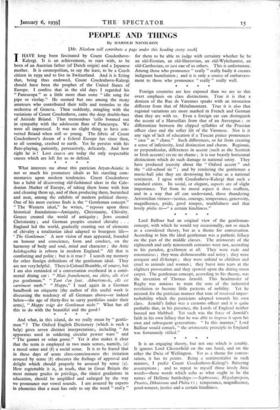What interests me about this patrician Aryan-Asiatic is not so
much his premature ideals as his startling com- mentaries upon modern tendencies. Count Coudenhove has a habit of discovering old-fashioned ideas in the Cale- donian Market of Europe, of taking them home with him and cleaning them up, and of then producing them, burnished and neat, among the exhibits of modern political theory. One of his most curious finds is the " Gentleman concept." " The Western ideal," he writes, " reposes upon three historical foundations—Antiquity, Christianity, Chivalry. Greece created the world of antiquity ; Jews created Christianity ; and German peoples created chivalry . . . England led the world, gradually creating out of elements of chivalry a totalitarian ideal adapted to bourgeois life- ' The Gentleman.' A new vision of man appeared, founded on honour and conscience, form and conduct, on the harmony of body and soul, mind and character ; the Attic kalokagathia is reborn in modem England." All that is comforting and polite ; but is it true ? I search my memory for other foreign definitions of the gentleman ideal. They are not very helpful. There is Colonel Bramble, of course, but I am also reminded of a conversation overheard in a conti- nental dining car : " Mais franchement, ma there, elle n'est pas gentleman." " Tant s'en Taut. Admettons-le, elle est carrement snob." " Mappe," I read again in a German handbook on etiquette (the author of this useful work is discussing, the tendency of all Germans above—or indeed below—the age of thirty-five to carry portfolios under their arms), " Mappe El-40 der Gentleman nicht." What has all this to do with the beautiful and the good ? * * * *










































 Previous page
Previous page